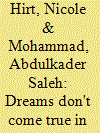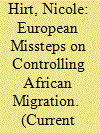| Srl | Item |
| 1 |
ID:
120918


|
|
|
|
|
| Publication |
2013.
|
| Summary/Abstract |
This article analyses contemporary Eritrea's acute crisis within the framework of the theory of anomie. It is based on the hypothesis that militarisation, forced labour, mass exodus and family disintegration can be interpreted as the consequences of two incompatible norm and value systems: the collectivist, nationalistic and militaristic worldview of the former liberation front and ruling party People's Front for Democracy and Justice (PFDJ), and the traditional cultural system of Eritrea's society. In 2002 the regime introduced an unlimited 'development campaign', thereby forcing large parts of the society to live as conscripts and perform unpaid labour. This has caused a mass exodus of young people and a rapid process of family disintegration. The article is based on empirical fieldwork and evaluates the ongoing developments which have led to rapid economic decline and the destabilisation of the entire fabric of society.
|
|
|
|
|
|
|
|
|
|
|
|
|
|
|
|
| 2 |
ID:
137758


|
|
|
|
|
| Summary/Abstract |
This article examines the impact of UN-imposed sanctions on the stability of the Eritrean regime, with a focus on the reaction of the diaspora. It explores the transnational nature of Eritrean society and examines the history and structure of the Eritrean diaspora as well as its transformation since the political crisis of 2001. The article demonstrates that the government, as well as both its supporters and its opponents in the diaspora, have all instrumentalized sanctions for their own purposes. The government has used sanctions to rally supporters “around the flag”, calling on the diaspora to raise funds to negate their effect. By contrast, opposition activists have campaigned against the 2 percent “diaspora tax” levied by the government, arguing that it may be used for illicit military purposes in breach of the sanctions regime. In this sense, the sanctions have destabilized a core component of the regime's resource base. However, the failure of the diasporic opposition to organize a joint campaign to persuade host governments to outlaw the collection of the tax has undermined its efforts. Funds raised through the diaspora tax thus continue to flow into government coffers, playing a stabilizing role in spite of the UN sanctions regime.
|
|
|
|
|
|
|
|
|
|
|
|
|
|
|
|
| 3 |
ID:
159446


|
|
|
|
|
| Summary/Abstract |
“In the long run, a policy whose main focus is on improving so-called border management in countries that are known to trample human rights and disrespect the rule of law cannot be successful.”
|
|
|
|
|
|
|
|
|
|
|
|
|
|
|
|